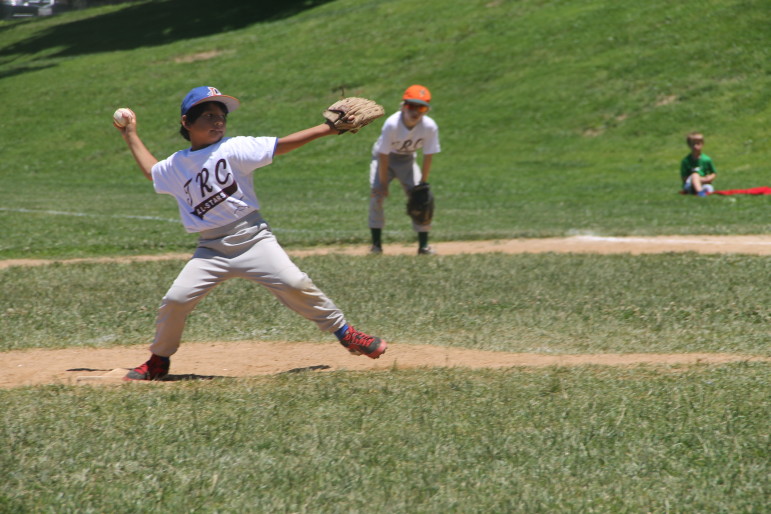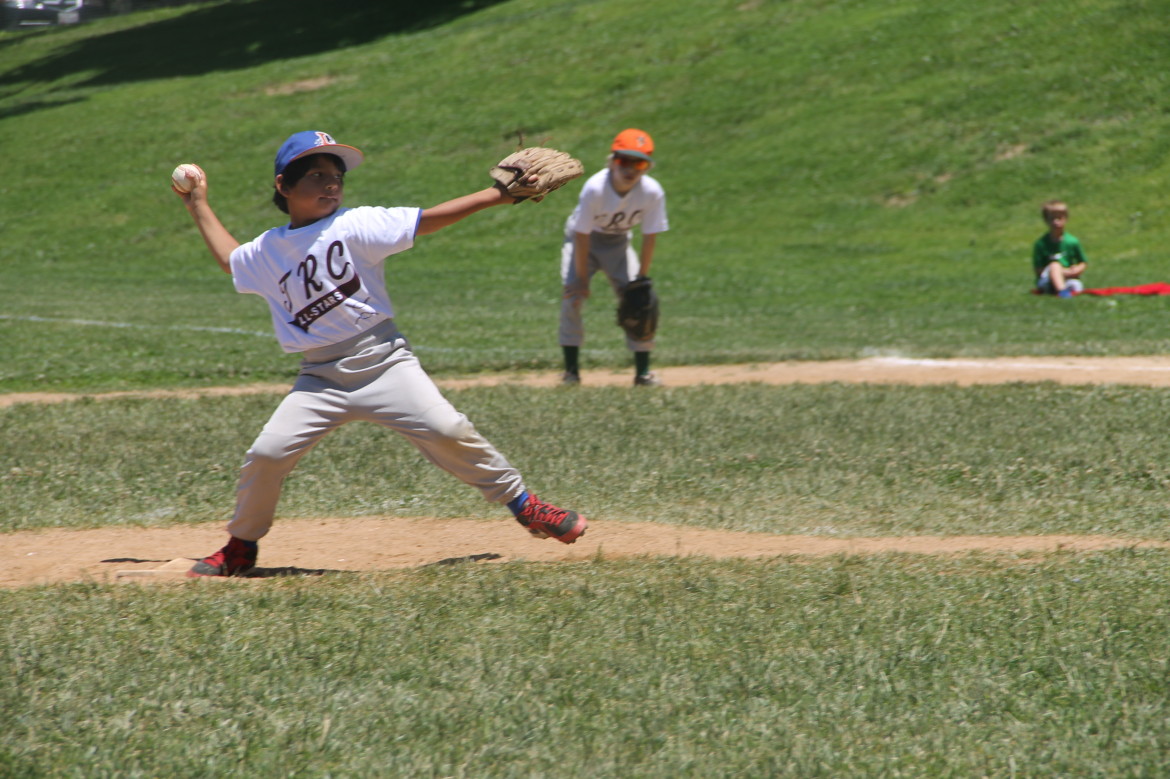
Gary Gately
Paulie Gately, seen pitching in a rec league baseball game this summer, was adopted from Guatemala as a 9-month-old in 2007.
BALTIMORE — I can’t look at the photographs of the faces of the desperate refugee children at America’s border without thinking of my son.
For I know Paulie, who is now 8 years old, could have been one of them, if not for fortunate, roll-of-the-dice circumstances.
You see, his homeland is Guatemala, from which we adopted him as a 9-month-old in 2007.
Guatemala, sadly, is one of the most violent countries in the world, along with Honduras (which has the highest murder rate on the planet) and El Salvador.
And violence — along with poverty and attempts to be reunited with family in the United States — have prompted something in the neighborhood of 60,000 unaccompanied children from Central America to cross the U.S. border since October.
Such is the desperation to free their children from horrific circumstances owing solely to their places of birth that mothers see a life-threatening, 1 ½-month journey to the border with a “coyote” as the best alternative — and perhaps the only way to ensure their children live.
Chicago Tribune columnist Clarence Page quotes Wendy Young, president of Kids In Need of Defense, which provides legal representation to unaccompanied immigrant children, recalling the desperation of one mother. “I would rather see my child die on the way to the United States than die on my doorstep,” Young recalled the mother’s saying.
Which brings me back to my son, whose smile lights up his whole cherubic face and whose fast ball earned him a spot as a pitcher on his rec baseball league team this summer.
In my mind’s eye, I can see Paulie making this dangerous crossing to escape the peril of his birthplace. (After all, children as young as 3 have made the journey, with coyotes, who smuggle immigrants across the border.)
Or, worse, being left behind in a country where boys not much older than him are sometimes threatened with death if they refuse to join a gang.
And what of Paulie’s kin back in Guatemala? What, I wonder, has become of the single mother who gave birth to him on April 30, 2006, and had been eking out a living at the time selling food from a cart in Guatemala City? And what of her other children?
Or the foster mother Paulie lived with for the first nine months of his life and the other foster children she took in, not to mention her five biological children?
It’s not so easy to say these Central American children should be sent back home to the violence and poverty many of them are fleeing when you realize your son could have been among them.
These children at our border are refugees and deserve to be treated as such.
How quickly we forget our history. Today, it’s Hispanics like Paulie who face xenophobia among conservatives who would deport these desperate children immediately.
But how many of us are descendants of people who had been rejected? We must remember that we are and always have been a nation of immigrants. Indeed, we are populated largely by descendants of immigrants no other country wanted – and immigrants rejected here in America at first as well.
My background is Irish and German. My Irish ancestors came after the Civil War, and my great-grandfather was born during the potato famine. At the time, the Know-Nothing party sought strict limits on immigrants entering this country, especially Catholics, like my great-grandfather, Thomas James Gately. In cities like Boston with large Irish immigrant populations, it wasn’t the least bit unusual to see signs reading “No Dogs or Irish Allowed.”
My German ancestors didn’t exactly receive a warm welcome either. They were fleeing Germany after the rule of Otto von Bismarck and the Franco-Prussian war of 1870. They were wanted neither by their old country nor what came to be their new country, America.
And so it went, with Italians, Jews, anyone from Eastern Europe and the Chinese, facing rejection here in America when they first arrived.
Now, it’s the Hispanics being blamed for taking American jobs, overwhelming schools and infrastructure and possibly bringing disease and violence into the country.
The xenophobia is nothing new, though it’s clearly still thriving in some circles.
Just listen to a modern-day Know-Nothing, Texas Gov. Rick Perry, speaking to National Guard troops in advance of their deployment to the border this week: "You now are the tip of the spear protecting Americans from these [drug] cartels. As they are able to get past you, they could be headed to any city, any neighborhood in this country, spreading their tentacles of crime, of fear."
Fortunately, most Americans can see this political posturing for what it is and recognize that most of the children — children — who crossed the border aren’t spreading tentacles of crime and fear but doing their best to escape rampant violence and poverty and seeking a better life in America.
The xenophobes of the world didn’t prevail in the days of the Know-Nothing party and won’t prevail today, thank God. It’s hard to imagine what our country would be like, if it existed at all, if we had kept out all the Irish, the Italians, the Jews, the Eastern Europeans, the Chinese.
America has always thrived on new blood, which has almost always meant some other country’s leftovers. Over and over, two or three generations later, the descendants of these leftovers shined as exemplary members of our society.
Keeping all immigrants out of this country would be every bit as dangerous as letting anyone who wants to enter the country do so.
Of course, we need an immigration policy that keeps out terrorists and human traffickers and drug traffickers and limits overall immigration, but also one that provides a humanitarian response to the current crisis at our southern border.
To live up to our American ideals, we have a moral obligation to help the children already here who have a legitimate claim to asylum because they fear violence or persecution back home.
I give thanks that Paulie made it across the border — by fortuitous circumstance — and I pray for his family and foster family, wherever they may be, whatever struggles they face today.

Beautiful, may God bless your precious family and the many innocent children who are not as fortunate as Paulie. It’s embarrassing how this country, which prides itself on foundations of equality, freedom, and social justice can turn its back on vulnerable, defenseless children. “The only time you turn your back on a child, is for him to climb on.”